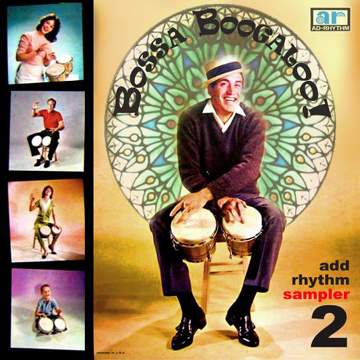bossa boogaloo
add rhythm sampler 2On Christmas 2013, I sent out almost fifty messages to musicians on three continents giving details of some rules, and the rhythm tracks that had been allocated to them, for the second Add Rhythm Sampler compilation:
“Merry Xmas and thank you for taking part in the ADD RHYTHM SAMPLER 2 compilation.
"The rhythm x has been chosen for you using the updated Krishna Tombola System. We hope you will enjoy the particular challenges that this rhythm will afford to a musician of yr talent. You may download and record your track using any of the four speeds of this rhythm: 16, 33, 45 or 78rpm. The track was originally intended to be played at 45rpm, and 33rpm also works very well, but more adventurous artists may wish to attempt one of the more extreme speeds: 16rpm or 78rpm.
"This rhythm must be used whole and without editing, pitch shifting, timestretching and certainly not reversed. A little EQ is permissable and it is allowed that a recording may precede the beginning of the rhythm, or carry on after it has ended.
"There is a certain amount of surface crackle on the tracks - you may keep this in or minimise it depending on where yr aesthetic takes you.
"With regards to instrumentation or style: entirely up you. Whether you choose to record a klezmercore power ballad or a water buffalo lowing along to the beat: it's yr trip man!
"Tracks should be submitted by midnight (UK time) on 31/1/14 in mp3 format, and will appear properly credited on a downloadable compilation on Archive.org."
Those of you who have been paying attention to the world of bespoke technique-based compilations will know that earlier in 2013 I collected twenty-seven tracks from musicians for the first Add Rhythm Sampler compilation.
The compilation was based upon a very simple concept: I had found two 7” singles recorded in 1967 on the Harrow-based Ad Rhythm record label. They contained four rhythms each in a variety of different dance styles of the era. These records were volumes one and three of Add Rhythm (note the two Ds here in contrast with the record label’s name) entitled: Pop Time and Dance Time respectively. They were intended for musicians who found themselves without a drummer and we are told that they were "the most effective practice aid a musician ever had".
When I proposed the compilation online it caused some excitement, which to my surprise actually prompted a number of musicians to submit some very good tracks based upon these rhythms. The result on the first Add Rhythm Sampler is there for all to see. And it was generally agreed amongst those twenty-seven musicians who had submitted tracks that this was all good fun and that we should do it again.
Fortunately one of those musicians, a certain Cathy Lucas, went one stage further and acquired the holy grail of the Add Rhythm project: the lost volume two entitled Latin American. Plans were put in place for a second volume.
There were fewer rhythms on this compilation than on volume one, but where on the original Add Rhythm Sampler tracks were only allocated as 33 or 45rpm, on this iteration artists could choose between 16, 33, 45 and 78rpm. The more extreme speeds -16rpm was excruciatingly slow and 78 was very fast indeed - were only taken up as a challenge in a few cases but often with exciting results.
Now that the tracks are in, once again I find myself once again dazzled by these bizarre, exotic riches. Listening through these tracks is like a glimpse into over two dozen alternate worlds, alternate interpretations of four latin rhythms, but more than that, a glimpse into the working processes of some highly imaginative minds and some deeply unorthodox working practices.
So all that remains is to thank the Add Rhythm All Stars once again for their music. And it is my pleasure to present for you the Bossa Boogaloo.
Enjoy!
Zali Krishna.

|
download
& stream
|
|
contributing
artists
|
|
| Rob
Loss Nil By Nose Justin D Fink Static Pino Masso Spaceship Iona Tanguay Silent Invisible Radiation Zali Krishna Tom Furse Adrian Carter Clare Whitney & Joe Button Drift of Signifieds |
Susan
Stakeout
Dessicant Tobias Van De Peer Dolly Dollycore Orlando Marion Andrau Ronny Waernes Resistance Bliss Simon Reuben White Teri Reed Body 13 Thumbalina Von Doom Master Taurus |
|
Website
& design by Zali Krishna 2014. |